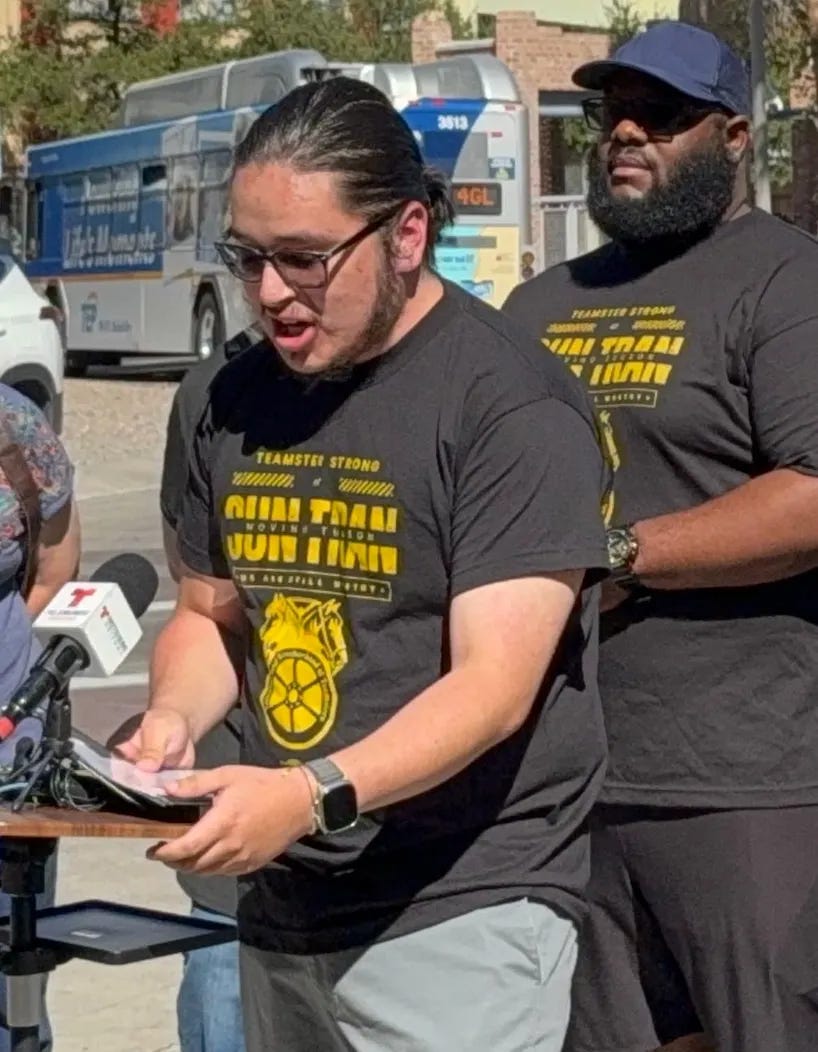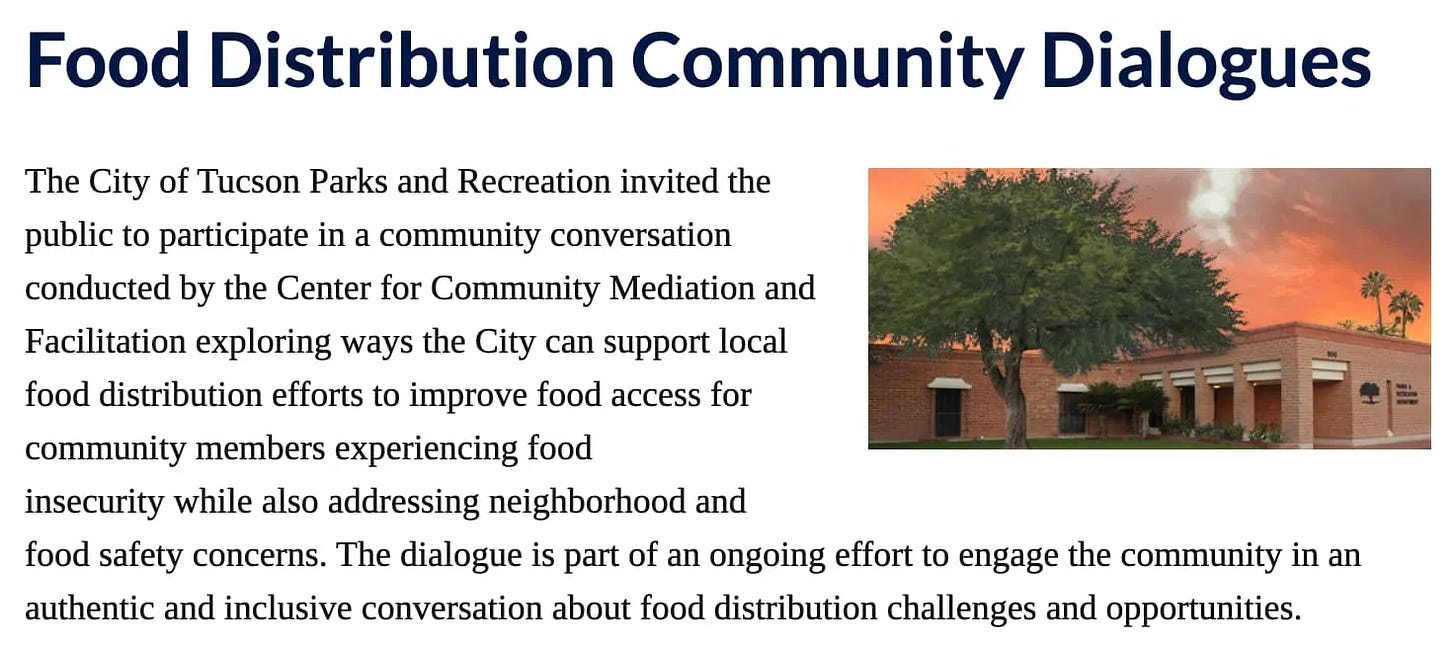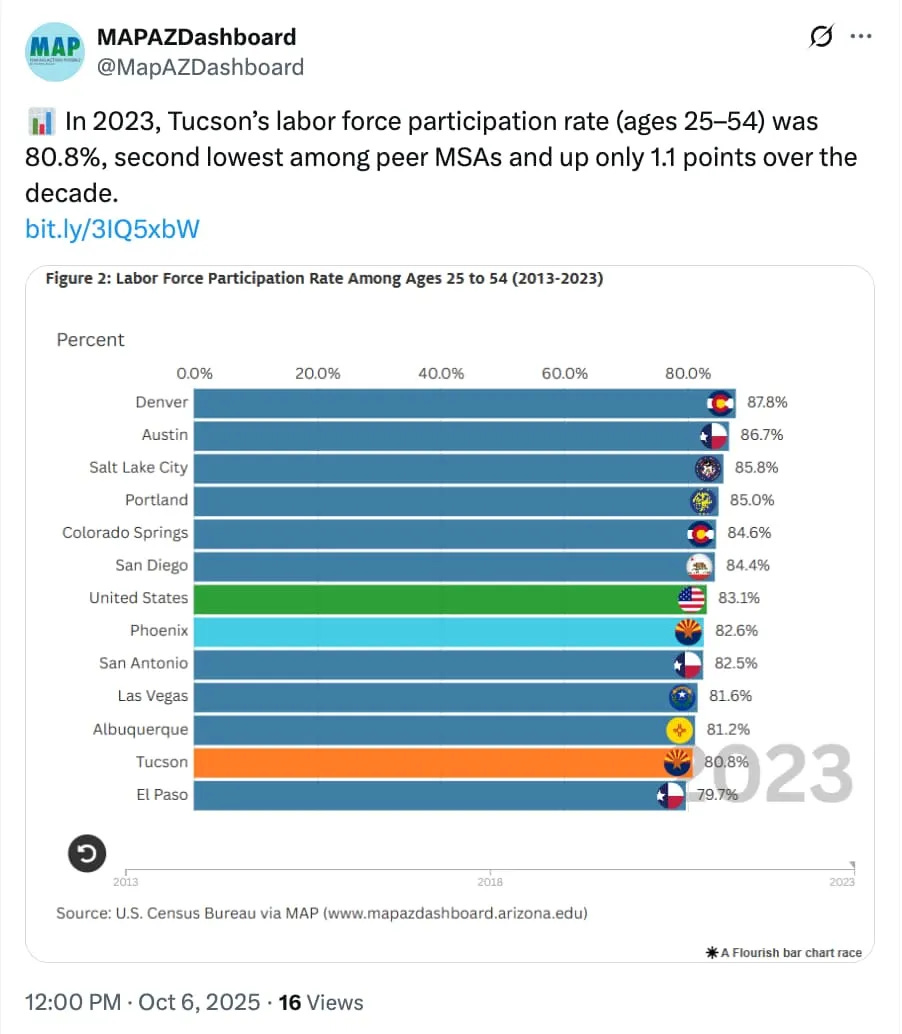Feeding the hungry — everywhere
New rules for feeding the homeless … Bus union backs a Republican … And that doesn’t look like Adelita.
Local nonprofits and religious groups will have an easier time feeding people in city parks after the City of Tucson decided to nix the requirement that they get permits to hand out meals.
The decision ends a tense standoff between the city and advocates for the homeless, who said the process of getting a permit was cumbersome and got in the way of helping feed the city’s most vulnerable.
While they’ll no longer need a permit, those looking to help the city’s growing homeless population will still need to abide by county health regulations as well as general park rules. For example, groups will need a food handling permit to give out prepared food, and they’ll have to collect the trash after handing out food.
The new rule does not apply to commercial food trucks or others looking to sell food in Tucson parks.
The city had been re-evaluating the permitting requirements for several months, holding public meetings to review the 2022 policy after requests from Vice Mayor Lane Santa Cruz and Councilwoman Karin Uhlich. City Manager Tim Thomure decided to change the policy in the last few weeks. Uhlich supported the decision, although she said she wasn’t directly consulted before Thomure pulled the trigger.
But it’s a controversial topic, Uhlich said, and her office receives complaints from the community from both ends of the political spectrum.
“Some say we shouldn’t be (feeding the homeless in parks) doing it all, while people want us to do more,” Uhlich said.
The old permitting process gave priority to parks near “hot spots for homeless activity” and considered whether other established meal sites were located within 1.5 miles of the requested location, which put serious limitations on where groups could feed the homeless.
For the last few years, Santa Rita Park was not eligible for feeding programs because of its proximity to Casa Maria Food Kitchen in South Tucson due to the now-abandoned policy.
The city also consulted with the corresponding Ward office before issuing the permit, which meant a layer of political oversight that could slow things down.
Practically speaking, only a handful of parks were being used to give food to the homeless:
Mission Manor
Mansfield Park
Todd Harris Sportsplex
Reid Park
Armory Park
Several parks are currently closed, including Armory Park and Santa Rita Park, which have historically been used for feeding the homeless. Both are undergoing voter-approved improvement projects.
While the city has roughly 120 parks, officials don’t think that about half of them — the smaller neighborhood parks — will be used by community groups and local churches. Lack of adequate parking and/or restroom facilities will likely be a barrier to serving large groups of people.
Several years ago, the Pima County Health Department worried that groups handing out prepared food weren’t always following food-safety rules. For example, they found food being left out too long, not stored at safe temperatures, or served without proper sanitation.
The council was also facing a push from residents near parks that housed food programs, who raised concerns about increased homeless presence, loitering and occasional disorder after mass feedings.
By requiring permits, the city could track who was organizing events, where, and when — and could adjust or deny applications if they anticipated conflicts.
At the time, the city worried that there were too many groups feeding the homeless in downtown parks — and not enough in other parts of town.
Brian Flagg, who has run the Casa Maria Soup Kitchen in South Tucson for more than four decades, said he was part of the discussions that led to the policy requiring permits in parks.
The old policy shut down the feeding at Santa Rita Park, pushing more people to Casa Maria.
But he has doubts about whether this change is necessary, noting that he views feeding the homeless in Santa Rita Park as simply feeding his neighbors.
The local Teamsters union, which represents bus drivers who work for Sun Tran, backed Republican Jay Tolkoff over Democrat Miranda Schubert in the race to represent midtown’s Ward 6 on the Tucson City Council.
At a press conference Monday morning, officials from Teamsters Local Union No. 104 joined several bus drivers who spoke about why they don’t have faith in the current city council to address chronic issues related to violence on city buses.

Bus drivers have been popping up at Tucson City Council meetings quite a bit over the last few months, advocating for better security.
Teamster officials didn’t weigh in on fare-free transit, which many in the community have argued is directly related to an increase in violence against drivers and other passengers on city buses.
However, several drivers complained that ridership has changed dramatically since the city eliminated fares during the pandemic, saying homeless individuals are driving out the working-class people who had been using the bus for years.
By endorsing Tolkoff, the Teamsters are staking out a position against Miranda, a socialist who has made fare-free transit part of her campaign.
The Teamsters haven’t weighed in on the other contested city council race this year between Democrat Kevin Dahl and Republican Janet Wittenbraker.
Making space for flights: As SpaceX sends its Starships into space, the reusable launch vehicles may fly over parts of Southern Arizona as they head back to Texas, the Arizona Daily Star’s Henry Brean reports. That could mean temporary closures of airspaces, a sign that space travel is intersecting more and more with plane travel.
Appealing to voters: Three local school districts are asking voters to approve budget overrides and bonds in November. The superintendents at Tucson Unified ($45 million override), Flowing Wells ($30 million bond) and Sunnyside ($120 million bond) make their pitches to voters in the Arizona Luminaria’s handy voter guide.
A blatant move: Democratic state Rep. Nancy Gutierrez urged University of Arizona officials not to sign the compact offered by the Trump administration. The Tucson Democrat penned an op-ed in the Tucson Sentinel saying the compact’s language about international students was “not only offensive but naive.” Other issues she has with the compact include “silencing faculty” and using “anti-LGBTQ+” language. In all, the compact is a “blatant move to end the independence of free thinking and higher learning,” she wrote.
Doodling away: The late Congressman Raúl Grijalva was a prolific doodler, and now 200 of his drawings can be seen at a new exhibit at The Projects/Space gallery in downtown Tucson, the Sentinel’s Mia Kortright reports. Among the doodles are those Grijalva made during hearings on U.S. Supreme Court Justice Brett Kavanaugh and hearings on the Jan. 6 attack on the U.S. Capitol. “The Drawings and Doodles of ¡Grijalva!” will be open to the public through Oct. 31.
You’ll get our word doodles in your inbox every morning if you click this button.
From the desert to the sea: A Tucson man was detained in Israel after he captained one of the boats meant to deliver food and aid to Gaza, Analeise Mayor reports for the Star. Logan Hollarsmith, who achieved local renown when he was arrested in 2017 for leaving water for migrants in the Southern Arizona desert, decided this summer to use his sailor skills to help the flotilla. His family is hoping he will be released from Israeli custody this week.
Unless Adelita Grijalva got one heck of a makeover, we think someone screwed up.
This week’s print edition of the Tucson Weekly features a photo of a woman who is very much not Adelita Grijalva atop a cutline reading: “Adelita Grijalva won the 2025 special election in Arizona’s 7th Congressional District, making her the representative-elect.”
But the real reason this makes the cut for our Laugh section is that the photo credit claims Grijalva both shot and submitted the photo herself. And that thought just makes us chuckle.
And yes, we know it’s bad luck/karma to make jokes about newspaper typos and other screwups.
We expect we’ll pay for this somehow.








The bus drivers’ union move is wise. The Sun Tran conversation is about the worker at its core—both the working class people who rely on transit for its core purpose (transportation) and the unionized bus drivers who make it possible. When councilmembers decided to extend fare-free transit, they floated the idea of using CSOs at bus stops to keep the peace, but that hasn’t happened yet (it seemed like a logical first step that required some urgency, instead of the sendoff celebration for the city attorney that used about 30 mins of the subsequent council meeting). Meanwhile, we have had 9 instances of violence (one death) at bus stops in the past year (most recently an elderly man was assaulted in an unprovoked way at an eastside stop). Council will likely have to choose between fare-free transit and having drivers, because this action from the union portends a strike.
The Republican legislature is too busy spending $1m on flying cars as to put security on public transit. It boggles the mind.